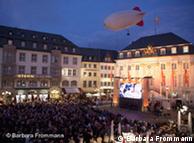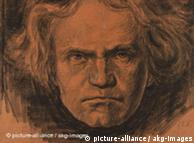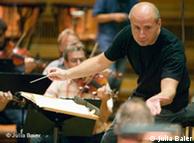Works of music become part of your genetics, says conductor Jarvi
Deutsche Welle
Conductor Paavo Jarvi has received numerous awards, including a Grammy and an ECHO Classic Conductor of the Year distinction in 2010. Born in Estonia, he moved to the United States, where he studied with Leonard Bernstein.
He is currently music director of both the Cincinnati Symphony Orchestra and the Frankfurt Radio Symphony Orchestra. Since 2004, he's been artistic director of the Deutsche Kammerphilharmonie (German Chamber Philharmonic) of Bremen, the Beethovenfest's orchestra-in-residence. Deutsche Welle spoke with Jarvi about the aims of the festival and the feeling behind the music performed there.
Deutsche Welle: There is an ongoing relationship between the Deutsche Kammerphilharmonie and the Beethovenfest, with the Kammerphilharmonie being the orchestra-in-residence. Has this collaboration influenced the culture and development of this body of musicians?
Paavo Jarvi: An orchestra that functions on a self-governing basis as we do needs good friends and good partners. And certainly the Beethovenfest in Bonn has been a fantastic partner. It does help to have a festival that is well run, has a good infrastructure, and has - most importantly - a real guiding light. I mean by that [Beethovenfest Director] Ilona Schmiel, who is an enormous source of energy. Her imagination and her interest in doing something new are really fantastic.
We know that Beethoven didn't have fond memories of Bonn. But is there something here, in the public and the atmosphere or in the expectations of the people, that strikes you?
 Bildunterschrift: Großansicht des Bildes mit der Bildunterschrift: Bonn is home to the annual Beethovenfest
Bildunterschrift: Großansicht des Bildes mit der Bildunterschrift: Bonn is home to the annual Beethovenfest
The festival has established itself as a place that really makes Beethoven its center. And let's face it: We're performing in a relatively modern hall, and the city is obviously different from when Beethoven was walking around here. But that is not so important. What is important is that the idea lives, the idea is strong, and [Bonn] is the right place to create a festival around Beethoven, because it is his birthplace. And to me, the real souls of the festival are the ones who create it. What Beethoven thought about the city when he was here is almost irrelevant.
This year's Beethovenfest also focuses on works by composer Robert Schumann. What is there to discover about such a frequently performed composer?
It's the type of gestures that Schumann makes in his music - emotional, dramatic gestures that communicate to you with such directness and sincerity. And there's that impulsive, neurotic energy, the extremes of expression, the moments that can go to unbelievable euphoria and, a second later, [to] the deepest, darkest melancholy.
To wear your heart on your sleeve in public, and go from one extreme to another and not be ashamed of it, is something that we have always been taught to be wrong. We're uncomfortable with that. What we are trying to do with the Kammerphilharmonie is to bring out just this aspect. Music by Schumann needs to be exaggerated on every level. Exaggerated, not put into an acceptable, comfortable norm.
Against the backdrop of thousands of recordings, and many, many others who have preceded you, do you feel the need to shake up the routine?
One of the most difficult things I find, in general, is changing old habits. People who have grown up with Brahms and Schumann and Beethoven have heard, so many times, those pieces in a certain way. They are simply so engrained that even if [these people] sometimes intellectually try to change something, when it comes to performance, they often fall back to those gestures that they heard when they were young. You simply need to have enough time and repetition to create a new tradition and make it your own.
That is something that is doable, especially if we do these Beethoven and Schumann "total immersion courses" - all symphonies in three days, or all Schumann symphonies and overtures in two days.
 Bildunterschrift: Großansicht des Bildes mit der Bildunterschrift: Playing a cycle, like all Beethoven symphonies, brings you amazingly close to the composer, says Jarvi
Bildunterschrift: Großansicht des Bildes mit der Bildunterschrift: Playing a cycle, like all Beethoven symphonies, brings you amazingly close to the composer, says Jarvi
It's amazing how close you can get to a composer if you really make an incredibly concentrated program of it and follow some principles and see how they work in other symphonies, overtures and so on. It gradually becomes a language that you identify with, not just intellectually; it becomes part of your genetics.
Would you prefer to shake up the routine or to strive for an authoritative interpretation?
l don't want to change things per se or to create something that hasn't been done. Quite the opposite. I want to do something that makes sense to me. The only reason I rethink certain things is because they never made sense to me to begin with.
Maybe one of the reasons our Beethoven is successful is that we do keep a lot of tradition in it. It has to be organic and it has to have an inner logic.
Interview: Rick Fulker
Editor: Elaine Yeung/Louisa Schaefer
http://www.dw-world.de/dw/article/0,,6058235,00.html

Comments